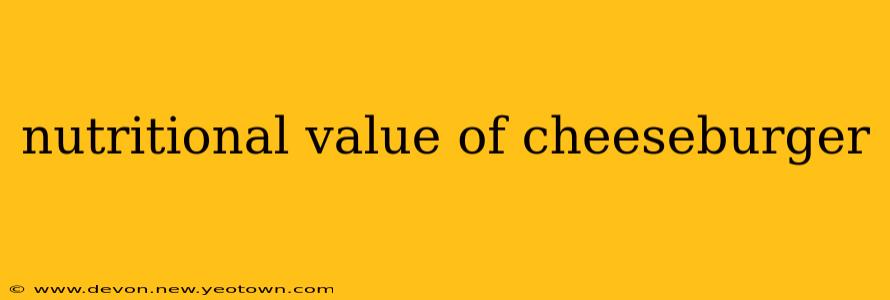The humble cheeseburger. A culinary icon, a lunchtime staple, a late-night craving. But beyond its deliciousness, what's really in that juicy patty and melty cheese? Let's dive into the nutritional value of a cheeseburger, exploring its components and how they contribute to your overall diet. The nutritional breakdown can vary wildly depending on the size, ingredients, and preparation method, but we'll explore the general picture and address some common concerns.
What are the main ingredients of a cheeseburger, and how do they contribute to its nutritional value?
A classic cheeseburger is a relatively simple dish, but the nutritional value depends heavily on the quality of its ingredients. The star players are the beef patty, cheese, bun, and any additions like lettuce, tomato, onion, or special sauces.
-
The Beef Patty: This provides the bulk of the protein and fat. The fat content influences the calorie count significantly; leaner beef will result in a lower-calorie cheeseburger. The protein content is essential for muscle building and repair.
-
The Cheese: This adds flavor, richness, and fat, but also contributes calcium and protein, albeit in smaller quantities compared to the beef. Different cheeses vary in their fat and calorie content; cheddar is a popular choice, while others, like Swiss or provolone, might have slightly different nutritional profiles.
-
The Bun: This is primarily carbohydrates, providing energy. However, buns often contain added sugars and refined flour, which can contribute to a higher glycemic index. Whole-wheat buns are a healthier alternative.
-
Toppings: The additions like lettuce, tomato, and onion offer vitamins, minerals, and fiber. These are essential for overall health and can help balance the fat and carbohydrates from other ingredients. Sauces, however, can add extra calories and sodium.
How many calories are in a typical cheeseburger?
This is a tricky question, as "typical" can vary enormously. A small, fast-food cheeseburger might contain around 300-400 calories, while a larger, restaurant-style cheeseburger could easily exceed 600 calories, sometimes even reaching 1000 or more, depending on the size of the patty, the type of cheese, and the toppings.
What are the macronutrients (protein, carbohydrates, and fat) in a cheeseburger?
The macronutrient breakdown also changes depending on the size and ingredients. Generally, a cheeseburger is relatively high in protein and fat, with a moderate amount of carbohydrates coming primarily from the bun. The ratio will shift based on the type of beef, the cheese selection, and bun type. For example, a cheeseburger made with lean beef and a whole-wheat bun will have a different macronutrient profile than one made with a thicker, fatty patty and a white bun.
What are the micronutrients (vitamins and minerals) in a cheeseburger?
While not a powerhouse of micronutrients, a cheeseburger does offer some. The cheese contributes calcium, while the beef offers iron and B vitamins. Added toppings like lettuce and tomato contribute vitamins A and C, potassium, and other essential minerals.
Is a cheeseburger healthy?
Whether a cheeseburger is "healthy" is highly subjective and depends on individual dietary needs and preferences. Occasional indulgence is unlikely to cause harm, particularly if you opt for leaner beef, whole-wheat buns, and plenty of healthy toppings. However, regular consumption of cheeseburgers, especially larger, high-fat versions, could contribute to weight gain, high cholesterol, and other health issues due to their high calorie, saturated fat, and sodium content. Moderation and mindful ingredient choices are key.
How can I make a healthier cheeseburger?
Making healthier choices is all about making smart swaps: lean beef over fatty beef, whole-wheat buns over white, and loading up on the healthy veggies! You can also consider reducing the cheese or opting for lower-fat varieties. Preparing your cheeseburger at home gives you complete control over the ingredients and portion sizes.
In conclusion, the nutritional value of a cheeseburger is a complex picture, dependent on numerous factors. By understanding the nutritional contribution of each ingredient and making mindful choices, you can enjoy this culinary classic while minimizing its potential health drawbacks. Remember, balance and moderation are key to a healthy diet!

